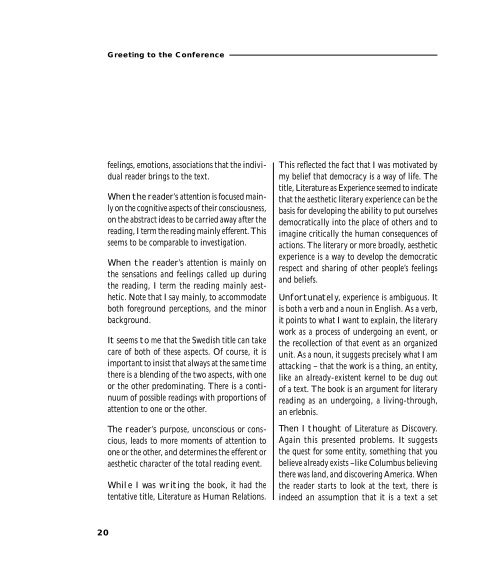Tidskrift för lärarutbildning och forskning 4-02/1-03
Tidskrift för lärarutbildning och forskning 4-02/1-03
Tidskrift för lärarutbildning och forskning 4-02/1-03
You also want an ePaper? Increase the reach of your titles
YUMPU automatically turns print PDFs into web optimized ePapers that Google loves.
Greeting to the Conference<br />
feelings, emotions, associations that the individual<br />
reader brings to the text.<br />
When the reader’s attention is focused mainly<br />
on the cognitive aspects of their consciousness,<br />
on the abstract ideas to be carried away after the<br />
reading, I term the reading mainly efferent. This<br />
seems to be comparable to investigation.<br />
When the reader’s attention is mainly on<br />
the sensations and feelings called up during<br />
the reading, I term the reading mainly aesthetic.<br />
Note that I say mainly, to accommodate<br />
both foreground perceptions, and the minor<br />
background.<br />
It seems to me that the Swedish title can take<br />
care of both of these aspects. Of course, it is<br />
important to insist that always at the same time<br />
there is a blending of the two aspects, with one<br />
or the other predominating. There is a continuum<br />
of possible readings with proportions of<br />
attention to one or the other.<br />
The reader’s purpose, unconscious or conscious,<br />
leads to more moments of attention to<br />
one or the other, and determines the efferent or<br />
aesthetic character of the total reading event.<br />
While I was writing the book, it had the<br />
tentative title, Literature as Human Relations.<br />
This reflected the fact that I was motivated by<br />
my belief that democracy is a way of life. The<br />
title, Literature as Experience seemed to indicate<br />
that the aesthetic literary experience can be the<br />
basis for developing the ability to put ourselves<br />
democratically into the place of others and to<br />
imagine critically the human consequences of<br />
actions. The literary or more broadly, aesthetic<br />
experience is a way to develop the democratic<br />
respect and sharing of other people’s feelings<br />
and beliefs.<br />
Unfortunately, experience is ambiguous. It<br />
is both a verb and a noun in English. As a verb,<br />
it points to what I want to explain, the literary<br />
work as a process of undergoing an event, or<br />
the recollection of that event as an organized<br />
unit. As a noun, it suggests precisely what I am<br />
attacking – that the work is a thing, an entity,<br />
like an already-existent kernel to be dug out<br />
of a text. The book is an argument for literary<br />
reading as an undergoing, a living-through,<br />
an erlebnis.<br />
Then I thought of Literature as Discovery.<br />
Again this presented problems. It suggests<br />
the quest for some entity, something that you<br />
believe already exists –like Columbus believing<br />
there was land, and discovering America. When<br />
the reader starts to look at the text, there is<br />
indeed an assumption that it is a text a set<br />
20

















